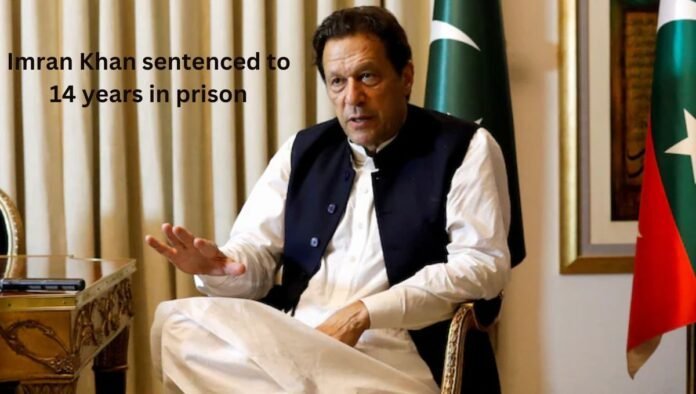In a significant development, a Pakistan anti-graft court has sentenced former Prime Minister Imran Khan to 14 years in prison following his conviction in a corruption case involving the Al-Qadir Trust, a welfare foundation he co-founded with his wife, Bushra Bibi. The court also sentenced Bushra Bibi to seven years in prison. The ruling was announced in a special court hearing held at a jail near Islamabad, where Khan has been incarcerated since August 2023.
The case revolves around allegations that funds and assets tied to the Al-Qadir Trust were misappropriated. Khan and his wife were accused of using the foundation for personal and political gain, rather than for its intended charitable purposes. The verdict was delivered after a lengthy trial, in which the prosecution argued that the pair misused their positions to channel funds inappropriately.
Khan’s conviction is seen as a pivotal moment in Pakistan’s political history, given his popularity and the significant influence he once held in the country’s political arena. Since his removal from office in 2022, Imran Khan has remained a dominant figure in the opposition, constantly challenging the existing political establishment.
Political Repercussions and Allegations of Persecution
Imran Khan, who has been involved in political leadership since founding his party, Pakistan Tehreek-e-Insaf (PTI), has become a thorn in the side of the country’s military-backed political structure. His ousting from power in April 2022 followed a no-confidence vote, which he alleged was orchestrated by Pakistan’s military establishment in collusion with opposition parties. Khan’s criticism of the military establishment has been a hallmark of his political career, and many analysts argue that his legal battles are closely tied to this ongoing power struggle.
Khan’s supporters claim that the corruption charges are politically motivated and that the government is using the judicial system to discredit and silence him. His conviction comes amidst what many perceive as an unprecedented crackdown on his party and its supporters. The PTI has claimed that these charges are part of a broader strategy to prevent Khan from returning to power.
In an emotional statement after the verdict, Khan declared, “I will neither make any deal nor seek any relief.” His firm refusal to back down has garnered widespread attention, as Khan continues to portray himself as a victim of political manipulation. He and his supporters argue that these legal challenges are designed to stifle democracy and suppress political dissent in Pakistan.
The Al-Qadir Trust Case: Details and Allegations
The Al-Qadir Trust, named after a revered Sufi figure, was established by Khan and his wife to support educational and welfare initiatives. However, the prosecution claims that the trust’s funds were diverted for personal use and political purposes, a serious charge that led to their conviction. While the defense team argues that the charges are baseless, the court found sufficient evidence to convict the pair.
Judge Nasir Javed Rana, who oversaw the case, announced the sentences, stating, “The prosecution has proven its case. Khan is convicted.” While Khan was sentenced to 14 years, his wife Bushra Bibi received a seven-year sentence. This conviction has drawn strong reactions both domestically and internationally, with many questioning the fairness of the trial.
In a further twist, Bushra Bibi, who had been out on bail prior to the verdict, was arrested at the court after the ruling. Her spokesperson, Mashal Yousafzai, confirmed the arrest, saying that her detention was a direct result of the guilty verdict.
Also Read: 8th Pay Commission Approved: Major Boost for Central Government Employees Before Budget 2025
Implications for PTI and Pakistan’s Political Landscape
Khan’s conviction could have far-reaching implications for Pakistan’s political future. Despite being embroiled in legal battles, his political party, PTI, remains the country’s most popular opposition force. In the February 2024 general elections, PTI won the highest number of seats, although it was unable to form a government due to a coalition of political parties that are more aligned with the military’s interests. This outcome left PTI sidelined, fueling further tensions between Khan and the current political establishment.
The military’s role in Pakistan’s politics has been a contentious issue for decades, and Khan’s outspoken criticism of military influence has made him a target for retaliation. His continued defiance against the military’s involvement in civilian governance has put him at odds with both the current government and the military leadership.
International Concerns and UN Findings
International human rights organizations and some governments have expressed concern over the fairness of Imran Khan trial and detention. A panel of United Nations experts released a statement last year suggesting that Khan’s detention had no legal basis and appeared to be aimed at preventing him from running for office in the upcoming elections. This has raised questions about the independence of Pakistan’s judiciary and its ability to deliver impartial justice.
Conclusion: A Divided Nation
Imran Khan sentencing is the latest chapter in Pakistan’s deeply polarized political landscape. As a former cricketer and popular leader, Khan’s fall from power has sparked widespread debate about the role of the military in politics, the rule of law, and the future of democracy in Pakistan. Imran Khan supporters view the conviction as a grave injustice, while his critics argue that it is a necessary step in addressing corruption and ensuring accountability.
As Pakistan faces mounting political uncertainty, Imran Khan defiance is likely to continue to shape the nation’s political discourse for years to come. His supporters remain steadfast in their belief that Imran Khan is being persecuted for standing up against the status quo, while the government and military-backed parties argue that his actions have undermined the country’s democratic institutions. The coming months will be crucial in determining the future trajectory of Pakistan’s democracy and governance.









